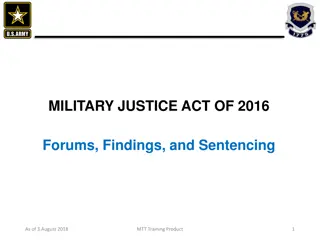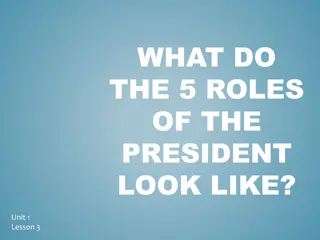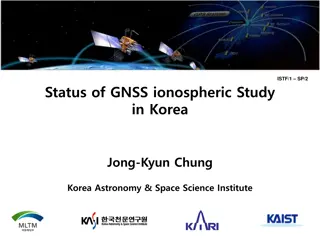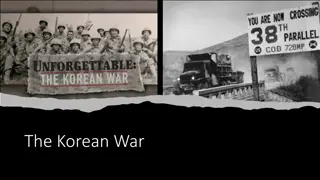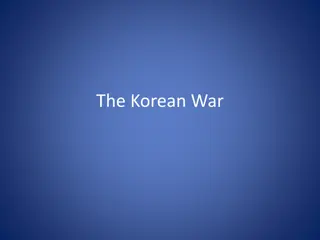South Korea as President Yoon Suk Yeol declares martial law
In South Korea's biggest political crisis in decades, President Yoon declared martial law on Tuesday to counter "anti-state forces" among political opponents. However, lawmakers unanimously rejected the decree, and thec later agreed to scrap it.
Download Presentation

Please find below an Image/Link to download the presentation.
The content on the website is provided AS IS for your information and personal use only. It may not be sold, licensed, or shared on other websites without obtaining consent from the author. Download presentation by click this link. If you encounter any issues during the download, it is possible that the publisher has removed the file from their server.
E N D
Presentation Transcript
A person holds a placard that reads "Democracy will not surrender to Yoon Suk Yeol" as people gather outside the National Assembly, after South Korean President Yoon Suk Yeol declared martial law, in Seoul, South Korea, December 4. REUTERS/Kim Soo-hyeon
Furniture and boxes are piled up to barricade the entrance doors of the National Assembly, after South Korean President Yoon Suk Yeol declared martial law, in Seoul, South Korea, December 4. REUTERS/Kim Hong-Ji
People gesture outside the National Assembly, after South Korean President Yoon Suk Yeol declared martial law, in Seoul, South Korea, December 4. REUTERS/Kim Soo-hyeon
Police officers close the gate of the National Assembly, after South Korean President Yoon Suk Yeol declared martial law, in Seoul, South Korea, December 4. REUTERS/Kim Hong-Ji
Soldiers advance to the main building of the National Assembly after South Korean President Yoon Suk Yeol declared martial law in Seoul, South Korea, December 3. Yonhap via REUTERS
South Korea's main opposition Democratic Party's staff set up a barricade to block soldiers at the National Assembly after South Korean President Yoon Suk Yeol declared martial law in Seoul, South Korea, December 3. Yonhap via REUTERS
A woman lies on a road to block a vehicle transporting an army unit, after South Korean President Yoon Suk Yeol declared martial law, in Seoul, South Korea, December 4. REUTERS/Kim Hong-Ji
Military forces move outside the National Assembly, after South Korean President Yoon Suk Yeol declared martial law, in Seoul, South Korea, December 4. REUTERS/Kim Hong-Ji
Police officers walk among the crowd, after South Korean President Yoon Suk Yeol declared martial law, in Seoul, South Korea, December 4. REUTERS/Kim Hong-Ji
Members of the military make their way through the crowd in front of the National Assembly, after South Korean President Yoon Suk Yeol declared martial law, in Seoul, South Korea, December 4. REUTERS/Kim Hong-Ji
A woman lies on a road to block a vehicle transporting an army unit, after South Korean President Yoon Suk Yeol declared martial law, in Seoul, South Korea, December 4. REUTERS/Kim Hong-Ji
A helicopter flies around the National Assembly hall after South Korean President Yoon Suk Yeol declared martial law in Seoul, South Korea, December 3. Yonhap via REUTERS
People wave banners as military helicopters fly, after South Korean President Yoon Suk Yeol declared martial law, in Seoul, South Korea, December 4. REUTERS/Kim Hong-Ji
Police officers stand guard at the gate of the National Assembly, after South Korean President Yoon Suk Yeol declared martial law, in Seoul, South Korea, December 4. REUTERS/Kim Hong-Ji
Police officers close the gate of the National Assembly, after South Korean President Yoon Suk Yeol declared martial law, in Seoul, South Korea, December 4. REUTERS/Kim Hong-Ji
People react as police close the gate of the National Assembly, after South Korean President Yoon Suk Yeol declared martial law, in Seoul, South Korea, December 4. REUTERS/Kim Hong-Ji
South Korean flag hangs on a pole outside the gate of the National Assembly, after South Korean President Yoon Suk Yeol declared martial law, in Seoul, South Korea, December 4. REUTERS/Kim Hong-Ji
Members of the military make their way through the crowd in front of the National Assembly, after South Korean President Yoon Suk Yeol declared martial law, in Seoul, South Korea, December 4. REUTERS/Kim Hong-Ji
A person gestures while standing among the crowd outside the National Assembly, after South Korean President Yoon Suk Yeol declared martial law, in Seoul, South Korea, December 4, 2024. REUTERS/Kim Soo-hyeon
People shout slogans in front of the gate of the National Assembly, after South Korean President Yoon Suk Yeol declared martial law, in Seoul, South Korea, December 4. REUTERS/Kim Hong-Ji
Police officers stand guard at the gate of the National Assembly, after South Korean President Yoon Suk Yeol declared martial law, in Seoul, South Korea, December 4. REUTERS/Kim Hong-Ji
People shout slogans in front of the gate of the National Assembly, after South Korean President Yoon Suk Yeol declared martial law, in Seoul, South Korea, December 4. REUTERS/Kim Hong-Ji
Soldiers prepare to advance to the main building of the National Assembly after South Korean President Yoon Suk Yeol declared martial law in Seoul, South Korea, December 3. Yonhap via REUTERS
Soldiers get off a helicopter at the National Assembly after South Korean President Yoon Suk Yeol declared martial law in Seoul, South Korea, December 3. Yonhap via REUTERS
Police officers block the entry to the National Assembly after South Korean President Yoon Suk Yeol declared martial law in Seoul, South Korea, December 3. Yonhap via REUTERS
Police officers stand guard at the gate of the National Assembly, after South Korean President Yoon Suk Yeol declared martial law, in Seoul, South Korea, December 4. REUTERS/Kim Hong-Ji
Helicopters fly, after South Korean President Yoon Suk Yeol declared martial law, in Seoul, South Korea, December 4. REUTERS/Kim Hong-Ji
People gather outside the National Assembly, after South Korean President Yoon Suk Yeol declared martial law, in Seoul, South Korea, December 4. REUTERS/Kim Soo-hyeon









